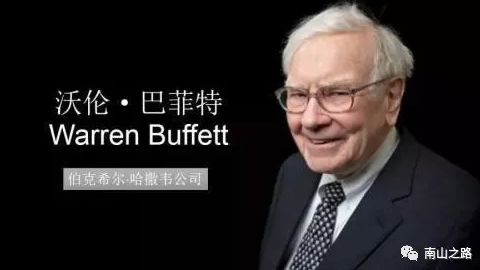Source: Nanshan Road
When I was visiting the investment forum, I found that a topic that many people like to argue about is whether stock investment should be concentrated or not. There are different opinions on this issue, and many investment leaders also hold different opinions. Some people think that it is good to concentrate, while others firmly believe that it is better to be moderately dispersed.
In fact, on the way to investment, I was a little confused about this. After thinking about it, the answer I got was that the best way to make myself more comfortable was.
Before the specific discussion, I would like to talk about my understanding of centralization and decentralization. I think holding more than 10 is relatively scattered, less than 3 is absolutely concentrated, then holding 4-10 is a fuzzy range. With a clear definition, let's have a serious discussion next.
I. concentrated investment
In the school of concentrated investment, there are too many well-known bosses, Buffett, Charlie Munger, Philip, the father of growth stock investment. Fei Xue and Duan Yongping are all firm and concentrated investors. Let me talk about it one by one.
1. Buffett, the god of stock
"our strategy is to hold shares centrally," Buffett said.For those businesses and prices that are not attractive enough, we try to avoid buying a little bit of this and a little bit of that.When we find an investment attractive enough, we buy a lot of it.」
"We continue to focus our money on a few companies that we can learn more about. Only a very small number of companies can make us confident and willing to hold on for a long time. "

"I increasingly believe that the right way to invest is to invest most of your money in a cause that you know well and trust it to manage, the idea that you can control investment risk by diversifying your money into a large number of companies that you don't know much about and have little confidence in.」
Judging from these words, Buffett is really a player who likes to bet heavily when an opportunity arises.
However, Buffett had a strict 40 per cent limit on his single position until American Express Co encountered the "salad oil crisis" in 1964 and ushered in a historic investment opportunity to break this limit.
2. Charlie.Munger
Buffett's assistant, Charlie.·Munger is a more determined concentrated investor. In his investment career, Munger rarely holds more than three stocks.。
Munger said: "what one can understand in a lifetime is limited, and these things happen to be cheaper, or even much lower than their value, for a variety of reasons." Therefore, when such an opportunity comes, it must be heavily positioned.
After a heavy position, one dollar cannot be put in two places at the same time. The result, of course, is the concentration of investment. "
3. Philip. Fei Xue
Philip·Fei XueIn an interview at the age of 80, he said that his core shareholding was only 4.They are all the kind of companies they want very much.
4. Duan Yongping
Duan Yongping, a legendary entrepreneur who has been transformed into an outstanding investor, said: "Buffett can only make more than a dozen. At my level, it's not easy for us to do two or three. Why do we have to do more than a dozen or more?。I've had more than a dozen of this process before, but I found it impossible to do it at all.Because you can't understand, it's very difficult to understand a company.」

Why do these excellent investors choose to concentrate their investments?
The reason is that it's really hard to know enough about a company, and they naturally buy when stock prices plummet for a variety of reasons.Investment is actually a game based on probability and odds. When they think that high probability and high odds come hand in hand, it is unforgivable not to bet heavily and let the opportunity be lost in vain!
This is where the advantage of concentrated investment lies:
For those who have a deep understanding of the company's business model and enterprise value, concentrating superior forces to fight a war of annihilation is not only a way to improve their certainty and victory, but also a very fruitful way. Concentrated investment under such a premise can greatly reduce the risk of investment. after all, one of the most common risks of investment is the risk of missing opportunities.
II. Diversification of investment
In the decentralized investment school, in fact, there are countless bosses waving flags and shouting, bidding for grandparents Graham and super investor Walter. Shross and Peter Lynch are all figures of this school. There are even economists who won the Nobel Prize in economics for their research on portfolio investment.
1、Graham.
In his book Smart Investor, Graham advises investors to appropriately spread among 10-30 stocks.
2. Walter. Shross
Walter, who is called by Buffett as a member of the Super Investor Club. Shross, who has held more than 100 shares for a long time.
Shross said:"Warren. Buffett is very accurate in judging people and enterprises. Our style is different from his. He can find five companies that he can understand, and almost all of them are financial companies. He is good at it. We really can't do it. People need to know what they can and can't do. "
3. Peter. Lynch.
Peter Lynch, who is regarded as one of the two best fund managers in the history of the United States, almost bought any good stock when he was in charge of the Magellan Fund, and at its peak he held more than 1400 stocks (of course, I think this was nonsense). It doesn't prevent him from achieving excellent investment performance.
4. Marco. Witts
As for the economist Markowitz, he won the 1990 Nobel Prize in Economics based on the theory of portfolio investment.Asset allocation theory is considered to be a free lunch for investors:The theory holds that a moderately diversified investment strategy can effectively reduce the risk without reducing the return.
However, this theory also points out that when there are more than 25 stocks in the portfolio, continuing to increase the number of holdings has little effect on reducing risk.
On the whole, diversification seems to have its own advantages.
First of all, there is also a 20% rule in company analysis, that is, 20% of the time invested in the research actually produces 80% of the results, and continuing to spend a lot of time studying the marginal benefits of a single company is declining.
Secondly, no matter how meticulous research, it is also difficult to avoid the black swan incident of the industry or individual stocks, such as this year's Metro Holdings incident, 2013 Maotai anti-corruption and plasticizer crisis and so on.
Therefore, moderate diversification can really reduce the risk and optimize the investment benefit.
Third, should we concentrate or disperse?
Having said so much, it seems that concentrated investment is also good, and decentralized investment is also very OK, so how on earth can this problem be broken?
Actually, it's like I said.Whether it is concentration or distraction, you should follow your own heart and choose. The way to make yourself comfortable is the best, and what suits you is the best.
Specifically, I think this problem should be solved in the following ways:
First, different people make different choices.
Some people are indeed superior in business vision, and most of these people have deep experience in running a business, such as Buffett, Duan Yongping, or have a unique way of thinking about the business model, such as Munger, Fisher and so on. then such a vision naturally can not be wasted. For this passer-by, absolute concentration of investment is the best.
But for others (perhaps most of us), proper dispersion is necessary.Big investors such as Peter Lynch and Walter Shross have also chosen a considerable degree of diversification, especially when Shross admits that he is not so accurate about the company.
For ordinary investors, who can be sure that their vision must be outstanding? So I think moderate dispersion may be more suitable for most people. We should make a plan according to our own actual situation.
Second, make different choices at different times.
In the current stage of the stock market, I think what bothers me most is that there are too few cheap and good companies, and there are few investment opportunities that can be seen at a glance. I believe there are many friends who have this feeling. Well, at times like this, I think it's a good choice to have more distractions.
But,If there is a sharp fall in stock prices that we know very well, when we reach the diamond-level buying opportunity, we should also buy it heavily.After all, although the business vision of ordinary people is not as good as that of bosses, there should still be several companies with a deep understanding. So when the opportunity comes, we can also make a big bet.
The last thing I want to say isWhether it is concentration or dispersion, do not do it deliberately: concentration for the sake of concentration increases the risk, and dispersion for the sake of dispersion will only increase the possibility of stepping on mines. At the same time, when dispersed, more than 25 stocks are very unnecessary.
I have been pursuing a highly unrelated portfolio for the past year or two. In fact, I have pursued too much, and a better choice should be to buy more when I see a good opportunity, rather than pursuing irrelevance unilaterally, because this actually lowers my income, although it effectively reduces the volatility of the portfolio. But also missed a better opportunity. In terms of the number of holdings, I choose the fuzzy range that makes me most comfortable, that is, 4-10 stocks.
So we should still useThe first principle is to buy stocks at a cost-effective price, and the second principle is to establish an unrelated combination. When the first principle is not easy to achieve, the second principle is used as the guiding strategy.
A big premise of this is that the stock market is the highest-yielding large class of assets, and in most cases, I cannot predict future stock price movements.
Edit / Phoebe
